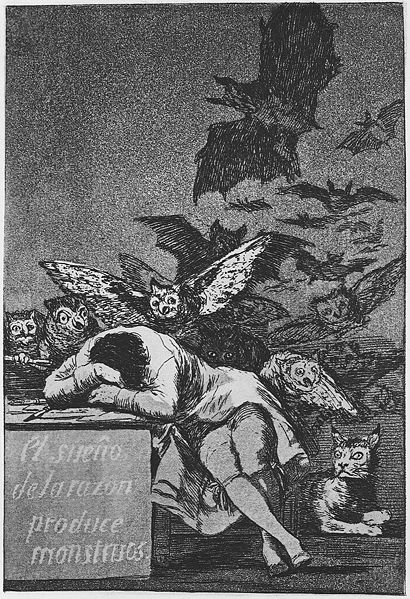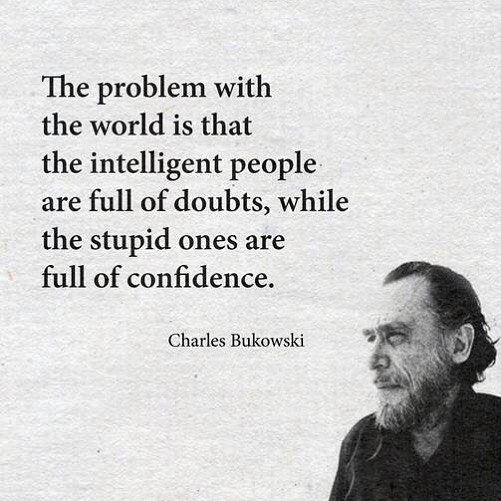
tadyatha om gate gate paragate parasamgate bodhi svaha

Doubt
debit
dubiousness
the venomous fangs of doubt
" Belief in ideas and principles which do not serve one's own happiness"
belief in negative concepts
belief that one is operating in a "debit" status
lack of credibility
lack of faith in the inner power
the single most dangerous toxin in all of human life

Francisco Goya
El sueño de la razón produce monstruos , c. 1797-CE
= The Sleep of Reason Produces Monsters
en.wikipedia.org/wiki/The_Sleep_of_Reason_Produces_Monsters
You are never really actually in doubt, you are always completely trusting in something.
The question is, what do you trust in?"
~~Bashar
" The mind is its own place, and in itself
Can make a heav'n of hell, ahell of heav'n."
John Milton, Paradise Lost : 1:254-255
Tenzing Gyatso, Lighting the Way, p. 25-26
" The process of overcoming our defilements goes in conjunction with gaining higher levels of realisation.
In fact, when we speak of gaining higher levels of realisation in Buddhism we are speaking primarily of the processes through which our wisdom and insight deepen.
It is actually the wisdom aspect that enables the practitioner to move from one level to the next on the path.
The attainment of the levels of the path is explained in condensed form in the Heart Sutra, where we find the mantra tadyatha om gate gate paragate parasamgate bodhi svaha .
- Tadyatha means It is thus
- gate gate means go, go
- paragate means go beyond and transcend
- parasamgate means go utterly beyond, go thoroughly beyond
- and bodhi svaha means firmly rooted in enlightenment."
Vocabulary for "Doubt" from www.etymonline.com=
to dread, fear," from Old French doter "doubt, be doubtful; be afraid,"
-
from Latin dubitare "to doubt, question, hesitate, waver in opinion" originally "to have to choose between two things."
-
The sense of "fear" developed in Old French and was passed on to English.
-
Meaning "to be uncertain" is attested in English from c.1300. The -b- was restored 14c. by scribes in imitation of Latin.
-
Replaced Old English tweogan ... from tweon "two," on notion of "of two minds " or the choice of two implied in Latin dubitare
cf. Ger. Zweifel - doubt, from zwei two

According to Bashar, these needs are the baseline for life on Earth. So long is possessed of these core seven, terrestrial humanoid life is operating properly. There is no need to over-reach beyond these seven, as these seven with in themselves prove to be fully satisfactory.
1) Air to breathe
2) Water to bathe and drink
3) Sleep and Dreaam
4) Food (breatharians are using nutrient from air)
5) Shelter from the elements
6) Connection – relationship to other beings
7) Personal Unique Creative expression
Q: I would like to hope for a better future in this relationship. Will we get together again? We have been on the decline for years. Now my estranged spouse tells me, via text message, that she hopes we can begin healing and reconciliation. However, she's moved into a separate apartment and I feel relieved now to have my space.
A: Ah, the tyranny of hope.
Essentially, hope is a guilt -mask behind which lurks cognitive dissonance. One is making a statement that one should believe yet the Learner does not believe.
Hope is the thought which partners with the emotion of guilt. Like guilt, hope creates a misguided and deceptive loop which eats its own tail. Most spiritual teachers counsel to avoid the three greatest dangers to clear thinking: doubt, blame, and hope.
Set aside the dysfunctional belief-non-belief of 'hope'. Look honestly at your actions.
Beliefs produced thoughts, electro-magnetic initiating thoughts simultaneously attach to feelings, and feelings produce behaviors. If you are seeking to identify the true belief, step backwards from the action (moving out of shared home) to the feeling (_______) to the thought-instruction (prepare to move out) to the belief (it is necessary to move out).
Hope is a great deceiver; so is doubt.
Q: Why should I believe it will be better at all in the next bhukti? It is pure misery and there is nothing I can do to change it. Should it have been this BAD in the first place?
A: The issue that blocks the Jyotishika's ability to deliver a coherent and satisfying Jyotisha answer to the querent is the pervasive presence of guilt within the querent's should questions.
'why should I believe' is not answerable within the interpretive paradigm of Jyotisha-vidya.
The presence of should indicates that the question is driven by guilt. the samayavidya cannot answer should questions.
Guilt is a never-ending loop of self-blame, other-blame, and repeat.
Because guilt is a never-ending cycle, no matter what outside information one might acquire, the answer never reaches one's core, and there is no possibility of a conclusive answer.
These questions need to be reconstructed to be more specific and factual.
Belief is the antidote to doubt. Belief is a spiritual choice.
While this choice may seem arbitrary on the surface, it is actually the single most important most foundational choice of anyone's life. Anyone's.
-
The person who makes a positive choice to believe in the goodness of one's own life will be sustained through times of crisis.
-
The person who chooses not to believe in the existence of a higher power will be faced with a lifetime of failed relationships, wallowing in the misery of toxic doubt.
Sogyal Rinpoche used to say that the single most destructive mental behavior in human life is indulgence in doubt.
Jyotisha cannot assuage your doubt. The querent could ask the Jyotishika a thousand questions and never be satisfied with 1000 answers. If the querent is committed to living in a state of doubt, the mind will defend this duality. Doubt means double, having two minds. This is a decision which the querent alone can take, and a commitment which the querent alone must maintain.
If the querent would be willing to go through the questions that were sent and rewrite each query removing each 'should' and remove sweeping negative generalizations (" this BAD" ,"I am incapable" ,"never live a normal life again" ) the Jyotishika may try to match the querent's questions with answers from the database of Jyotishashastra commentary.
However, the Jyotishika cannot tell the querent what the querent should do, morally. Cultural-ethical advice is relevant only within the cell of a single culture. A village practitioner could align the principles of the samayavidya with the principles of whichever [local] Principled Way of Life is considered to be sacred. Thus a village Jyotishika often does serve as a moral adviser - by mixing the two datastreans.
...
No one outside of oneself can force the querent to have faith. If the querent is willing to take the positive step to accept an assertion that there is goodness in human life, and specifically that there is a permanent and unremovable seed of goodness in YOUR life, then there is at least a foundational potential for embarking on a reading.
But if the voice of negativity and doubt = allowed to dominate your consciousness, neither the great knowledge tradition of Jyotishavidya nor the small personality of a human self serving as a humble channel of that tradition can do a darn thing to help.
Throw off that slavery. Do not permit the self to become addicted to doubt.
Assert your right to Faith in Self, which is freely available to all people at all times. Simply claim that Right.

by Bernie Glassman and Rick Fields, p. 52
"In the beginning, it's easier to experience our controlling mind, with all our attachments, than the open mind of doubt and unknowing.
So the exercise is first to make a list of all our attachments. These might include ideas or things.
You might, for example, list possessions you think you need, such as a certain kind of car or clothes.
Then you might list ideas you consider important or true, such as the belief that you need to eat meat to get enough protein.
The point is to lay bare all our attachments - everything we think is essential to who we are.
Only when we let go of these attachments can we experience the open mind of doubt."
~~ John Fulton, Asclepion Healing " During a growth period, you need more amusement, more grounding, and more chocolate."


[How Readings Work] = [Sample Sacred Jewels Ratna Recommendation] = [Seva]
 updated:
06 January 2026
updated:
06 January 2026
[Copyright © 1994-2024 by Barbara Pijan Lama] = [Contact] = [How to Request a Jyotishavidya Reading]
Barbara Pijan Lama Jyotishavidya Vedic Astrology Surya Sun Chandra Moon Mangala Mars Budha Mercury Guru Jupiter Shukra Venus Shani Saturn Rahu Ketu Graha Planets Dasha Timeline Calendar Nakshatra Navamsha Marriage Children Treasury Career Spiritual Wisdom Cycles of re-Death and re-Birth
The information on barbarapijan.com , including all readings and reports, is provided for educational purposes only. Wishing you every happiness and continuing success in studies!
